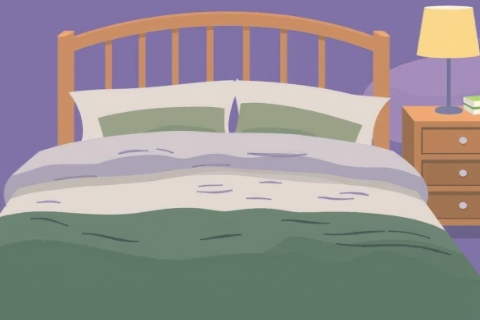Struggling to go to bed early? You’re not alone. Whether you’re a parent juggling responsibilities, a student burning the midnight oil, or an adult caught in a Netflix binge spiral, going to bed early can feel impossible. But here’s the thing—it doesn’t have to be.
Sleep is vital for your health, focus, and overall well-being. Shifting your bedtime earlier is one of the most powerful changes you can make. This blog will help by explaining why going to bed early matters, the challenges you may face, and practical steps to retrain your internal clock—backed by science and easily actionable.
Read on if you’re looking for a guide to better sleep habits. You’ll learn to beat procrastination, quiet your restless mind, and reclaim your nights for high-quality rest.
Why Going to Bed Early Matters More Than You Think
Getting enough sleep is essential. According to the CDC, adults need 7–9 hours of sleep every night. But it’s not just about the number of hours—it’s about when you go to bed. Here’s why:

Better Mental Clarity: Sleep supports cognitive functions like memory, focus, and decision-making. Studies show that early sleepers are more likely to wake refreshed and focused.
Improved Mood and Emotional Resilience: Consistent, early bedtimes regulate hormone levels, reducing stress and anxiety over time. Have you ever noticed how everything feels worse after a late night? That’s your body begging for routine.
Physical Health: Sleep isn’t just about energy; it’s about repair and recovery. Sleeping and waking on schedule can reduce risks of heart disease, diabetes, and even obesity.
Time for Yourself in the Morning: Early risers enjoy quiet, distraction-free mornings, giving them a head start on their day.
Once you understand the “why,” it’s easier to commit to fixing your sleeping habits.
The Common Challenges of Going to Bed Early (and How to Overcome Them)
Committing to earlier bedtimes isn’t always easy, and we face hurdles. Here’s how to address the roadblocks people often encounter:

Screen Time Trap
You lie down, open TikTok, and suddenly it’s 2 a.m. Sound familiar? The blue light from electronics tricks your brain into staying awake longer by suppressing melatonin production, the hormone responsible for sleep.
Solution:
- Use blue-light-blocking glasses or enable Night Mode on devices.
- Set an alarm an hour before bedtime to wind down. Use the time to read, meditate, or listen to calming music instead.
Overthinking Before Sleep
A racing mind often sabotages early bedtime goals, especially for students or parents juggling responsibilities.
Solution:
- Keep a “worry journal” beside your bed. Write down any worries or to-dos to clear your mind before bed.
- Practice mindfulness exercises. Apps like Calm or Headspace offer guided sessions to relax your thoughts.
Irregular Sleep Schedules
Maybe you work shifts or have kids who wake you up frequently. An irregular schedule disrupts your circadian rhythm, making early sleep difficult.
Solution:
- Pick a consistent bedtime and wake-up time—even on weekends. This reinforces your body’s internal clock.
- If possible, expose yourself to natural light in the morning, which helps reset your rhythm.
Sleep Procrastination
Sneaky “revenge bedtime procrastination” happens when people stay up late to reclaim personal time after a busy day.
Solution:
- Reframe your perspective. Remind yourself that enough sleep is the ultimate self-care.
- Plan short, enjoyable activities earlier in the day so you don’t feel “robbed” of leisure time.
Knowing these challenges and solutions beforehand helps you dodge those midnight pitfalls.
6 Steps to Start Going to Bed Early Today
Here’s a straightforward, actionable roadmap to help you catch those zzz’s sooner rather than later.

Set a Realistic Goal
Drastically, shifting your bedtime overnight isn’t sustainable. Start small, moving it earlier by 15–30 minutes each week until your target bedtime feels natural.
For example, if you currently sleep at midnight and aim for 10 p.m., start with 11:45 this week, 11:30 next week, and so on.
Establish a Calming Bedtime Routine
Signals matter. Bedtime routines are a cue, telling your brain it’s time to unwind. Create a ritual that works for you, such as:
- Taking a warm shower or bath
- Drinking herbal tea, like chamomile or lavender
- Turning down the lights or using a diffuser with calming scents
Consistency is key. Stick to your routine daily for the best results.
Limit Caffeine and Sugary Foods
Caffeine has a half-life of about 5 hours, meaning your afternoon coffee at 3 p.m. could still affect your sleep by 8 p.m. The same goes for sugary snacks late in the evening.
Opt for decaffeinated tea or snacks like almonds, bananas, or oats—foods that promote better sleep.
Create a Sleep-Friendly Environment
Comfort matters. A messy, bright, or noisy bedroom can ruin your shot at falling asleep early. Transform your space with these tips:
- Keep your room cool, ideally between 60–67°F.
- Invest in blackout curtains or an eye mask to eliminate light.
- Use white noise machines or apps like Noisli to drown out disruptive sounds.
Stay Active During the Day
Exercise reinforces your body’s sleep-wake cycle. Regular physical activity—cardio, yoga, or even brisk walks—helps you fall asleep faster and improves sleep quality.
Avoid intense workouts 2–3 hours before bedtime, which may leave your body feeling too energized.
Be Patient with Yourself
Breaking old habits takes time! If you slip and stay up, don’t beat yourself up. Reset the next day and keep trying. Celebrate small wins—like going to bed 5 minutes earlier—and build on them.
Progress, not perfection, is the goal here.
How Early Sleep Benefits Parents, Students, and Adults
While better sleep improves everyone’s life, different groups see unique benefits:
Parents: Quality sleep means more energy for parenting during the day. Early bedtimes also give you some quiet evening time back for yourself.
Students: More sleep means sharper focus for studying, better academic performance, and improved memory retention.
Adults: Consistent sleep boosts productivity, aids decision-making, and reduces long-term health risks.
Wherever you are, mastering your sleep ensures you’re ready to tackle the day ahead.
Start Sleeping Better Tonight
Going to bed early isn’t just a dream—it’s achievable with the right strategies. Setting realistic goals, creating a calming routine, and addressing distractions head-on can transform your nights and wake up feeling your best.
Frequently Asked Questions
Q: How many hours of sleep do I need?
A: Most adults need 7-9 hours of sleep each night to function at their best. However, individual needs vary slightly depending on age, lifestyle, and overall health.
Q: What can I do if I have trouble falling asleep early?
A: Building a relaxing bedtime routine can make all the difference. Try reducing screen time an hour before bed, drinking a warm, caffeine-free beverage, or practicing calming techniques like deep breathing or meditation.
Q: Does going to bed earlier mean I’ll wake up earlier?
A: Not necessarily. If you allow your body to wake naturally after enough rest, your wake-up time might align better with your daily schedule. Using an alarm clock set to your ideal morning time can also help.
Q: What if I have a busy schedule and can’t prioritize sleep?
A: Start small and adjust gradually. Even moving your bedtime 15 minutes earlier each night can result in more rest over time. Prioritizing sleep is an investment in your health, focus, and energy levels.
Q: Are naps helpful if I can’t sleep enough at night?
A: Short naps (around 20-30 minutes) can help recharge during the day without interfering with nighttime sleep. However, relying on naps instead of improving nighttime sleep isn’t a long-term solution.
Q: How can I create a consistent sleep routine?
A: Consistency is key. Aim to go to bed and wake up simultaneously every day, even on weekends. Establish a calming pre-sleep routine, such as reading or meditating, to signal your body that it’s time to wind down. Over time, this can help regulate your internal clock and improve the quality of your sleep.
Final Step:
Taking small, practical steps toward better sleep can improve your overall health and well-being. Be patient with yourself as you build new habits, and remember that consistency is more important than perfection. If sleep challenges persist despite your efforts, consider contacting a healthcare professional for guidance. By prioritizing sleep, you’re setting the foundation for a healthier and more energized life.
The best part? Each small adjustment compounds over time, leaving you better rested—and ready to take on the day—with every passing week. Change won’t happen overnight, but with patience and persistence, it will happen.
Sweet dreams!











